Tistung becoming a 'weekend destination'

We use Google Cloud Translation Services. Google requires we provide the following disclaimer relating to use of this service:
This service may contain translations powered by Google. Google disclaims all warranties related to the translations, expressed or implied, including any warranties of accuracy, reliability, and any implied warranties of merchantability, fitness for a particular purpose, and noninfringement.

Highlights
- After Arjunsingh Thakuri opened 'Om Adhyaya Retreat' resort, Thaha Municipality-6 Tistung of Makwanpur has increased in activity. The resort is crowded on weekends with people who want to get away from the hustle and bustle of the city, even for a day or two.



Just like a bird comes in the evening remembering its nest, the meaning of the arrival of a foreigner who returns home remembering the village is softened by a different juice. For example, Arjun Singh Thakuri, who moved to the city in the fifties, returned to the village a few years ago.

He also has a role to make Tistung more attractive and lively than before. Let's say, he is currently carrying the well-known poet Bhupal Rai's famous poem 'Dazai Kavita Gurmai Cha' in his mind - I have to do something in my village, I want to make the children of this village a good person . Yes, he is showing the children of the village the way to become Purakhis.
The beginning of June was drenched in rain, but the next day Tistung-Chitlang-Kulekhani continued to be sunny. Something like a feeling of excitement took hold . Arjun Singh was in his own village on that day, which opened after the rain of Asar. And he was glorifying the same village Tistung (Makwanpur). It seemed that the boy, who was tired of remembering the village, is engrossed in his own journey after reaching the village.
After Arjun opened the 'Om Adhyay Retreat' resort in Tistung, his visits to the village increased. As the sun sets on the west coast, the resort is lit up in multi-colored lights. The lavish resort evokes the sophisticated city of Thamel.
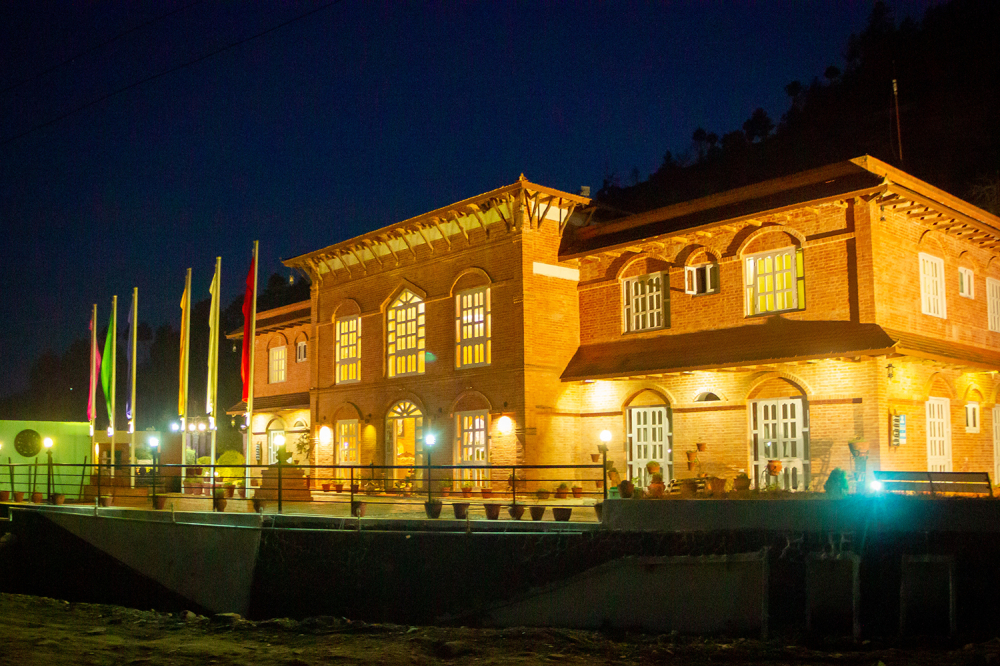 Arjuna's friends used to say about Adhyaya - this is a flower that bloomed in the kholsa. We wanted to use the local products of the village. We used to pick greens from the river next to the resort and eat them,' says Arjun, 'As friends say, may the resort be a flower that blooms in the river and always spread lust.'
Arjuna's friends used to say about Adhyaya - this is a flower that bloomed in the kholsa. We wanted to use the local products of the village. We used to pick greens from the river next to the resort and eat them,' says Arjun, 'As friends say, may the resort be a flower that blooms in the river and always spread lust.'
Arjun started 8 years ago, Om Adhyaya Retreat. At that time, he wanted to create a place where friends could hang out rather than a resort. Therefore, he spent 50 lakh rupees and ran a farm house on his own village land, in an eight-room house. However, foreigners and nomadic Nepalis also started coming to the farm house. Now 8 rooms were not enough, after that he dreamed a big dream.
 According to Arjun, apart from the land, 25 crore rupees have been spent on the resort so far. Friday-Saturday the resort is full. Arjuna wants visitors to his resort to spend their time 'not in a room, but in a quiet garden' - among the blooming flowers, where the bees are buzzing. City people climb this cool Chandragiri hill to refresh and refresh themselves from the busy time – to do yoga-meditation, play or enjoy music or go to the jungle or take a boat ride on Kulekhani to hike to nearby villages. Spread over 22 Ropani, the resort has conference rooms, concert hall, swimming pool, children's park and helipad.
According to Arjun, apart from the land, 25 crore rupees have been spent on the resort so far. Friday-Saturday the resort is full. Arjuna wants visitors to his resort to spend their time 'not in a room, but in a quiet garden' - among the blooming flowers, where the bees are buzzing. City people climb this cool Chandragiri hill to refresh and refresh themselves from the busy time – to do yoga-meditation, play or enjoy music or go to the jungle or take a boat ride on Kulekhani to hike to nearby villages. Spread over 22 Ropani, the resort has conference rooms, concert hall, swimming pool, children's park and helipad.
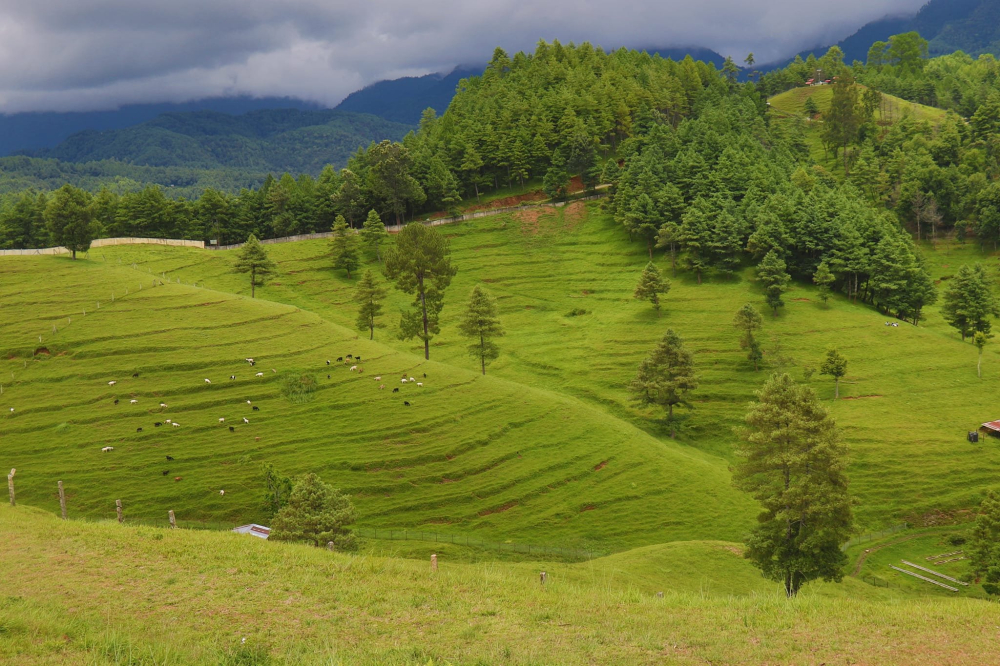 A crowd of people who want to get away from the hustle and bustle of the city for a day or two dances to DJ-music and live-bands amidst the colorful lights of the resort. People can also be seen enjoying a drink by the swimming pool or having a campfire on the hill.
A crowd of people who want to get away from the hustle and bustle of the city for a day or two dances to DJ-music and live-bands amidst the colorful lights of the resort. People can also be seen enjoying a drink by the swimming pool or having a campfire on the hill.
Here, freedom is felt more than the city and home. Even if you go to the mountains, even if you sit in the resort listening to emotional music,'' they say. As the morning begins, young people are seen on the hills around the resort. Some are seen enjoying sports while others are climbing hills on horseback. There is no shortage of people who come to the resort with the desire to eat local chicken, duck, duck, gundruk, phapar, and sisno.
Tistung, a dark settlement in the hills, has become buzzing with resorts. This historical Chitlang-Thankot road recites the forgotten old story of our Nepali history and politics. Before the construction of Tribhuvan Rajpath in 2011, this was the only route connecting Kathmandu with Madhesh and India. This is the same old road, which was once the lifeline of the Nepali Rana period. The old people of that time used to take the car that Hitler gave as a gift to King Mahendra to Kathmandu through this road. The route was – Raxaul, Birganj, Simra, Hetaunda, Bhimfedi, Kulekhani, Chitlang, Chandragiri via Kathmandu .
Is this the way that BP Koirala was handcuffed after the fierce protest against the Rana regime or is this the way Pushpalal Shrestha traveled to India? Mahakavi Lakshmi Prasad Devkota has an effective poem - 'Yatri'. It is said that he was going somewhere through this road, he wrote that poem on the way.
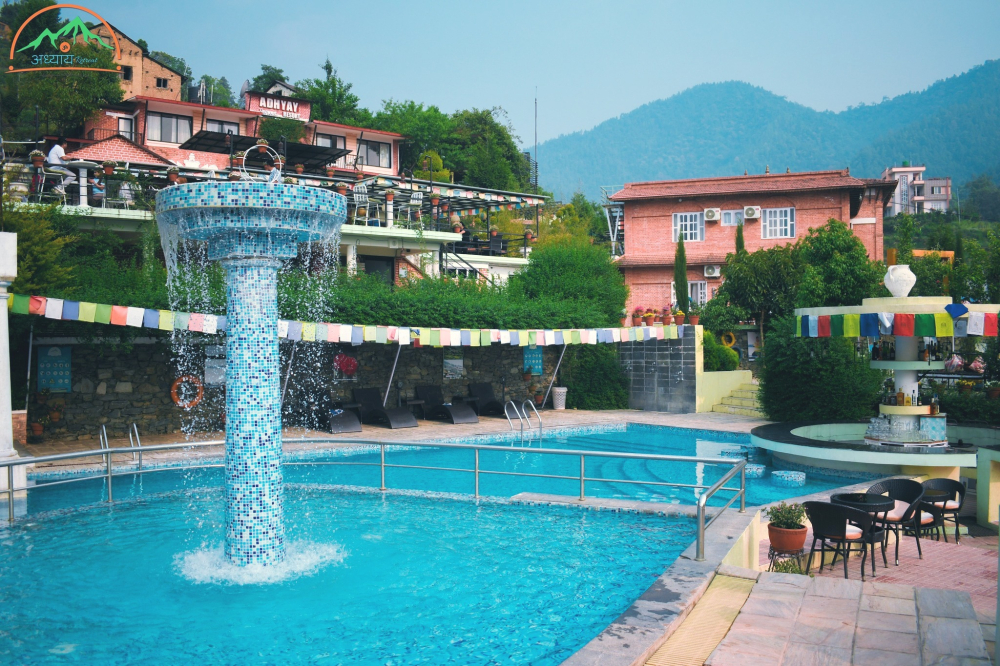 Arjun Singh Thakuri grew up in this Tistung. He thinks that nearby Hetaunda developed, but the settlements in the middle of Kathmandu remained the same. Arjunsingh thinks - My Tistung has dreams, labor and culture. However, young people who are going abroad with their dreams have a problem. 'So how can we stop that youth here?' Arjunsingh says, 'Especially we don't know the village. There is suffering here, but everything is in the village.' He trained him and gave him employment. Arjunsingh says, "I trained and gave jobs to the educated unemployed of the village and those who were dying to go abroad". He trained by going from Bharvarye Maham Hotel on the road to Star Hotel.'
Arjun Singh Thakuri grew up in this Tistung. He thinks that nearby Hetaunda developed, but the settlements in the middle of Kathmandu remained the same. Arjunsingh thinks - My Tistung has dreams, labor and culture. However, young people who are going abroad with their dreams have a problem. 'So how can we stop that youth here?' Arjunsingh says, 'Especially we don't know the village. There is suffering here, but everything is in the village.' He trained him and gave him employment. Arjunsingh says, "I trained and gave jobs to the educated unemployed of the village and those who were dying to go abroad". He trained by going from Bharvarye Maham Hotel on the road to Star Hotel.'
Arjun's wish is one thing - to make Teestung a 'weekend destination'. This dark village under the lights of Thaha Municipality-6 had brightened up Kathmandu around 38/40 through the Kulekhani project. However, in 52 years, his village, which is only 5 km away from Kulekhani, barely got electricity. Arjun read the book carefully. He remembers that when a 100-watt lamp is switched on in the village during peak hours, only the filament is lit. And, under that 'filament', he used to read by lighting a tuki. Tistung-Palung Khas was a ``jaxon'' for Ubela truck drivers to eat.
There was drought in Tistung from November to January. Rice, corn, millet, and sorghum grew, but there was not enough to eat throughout the year. Then a little rice would be exchanged for a lot of rice. Arjuna went to Mela, Parma and Gothalo to read about how much suffering there was at home. He didn't even have the money to enroll in school, but he got the best marks in his class every year. So he studied with a scholarship - Greenledge Bank (now Standard Chartered Bank) gave him a scholarship in 8th, 9th and 10th classes under a program, worth 900 rupees per year.
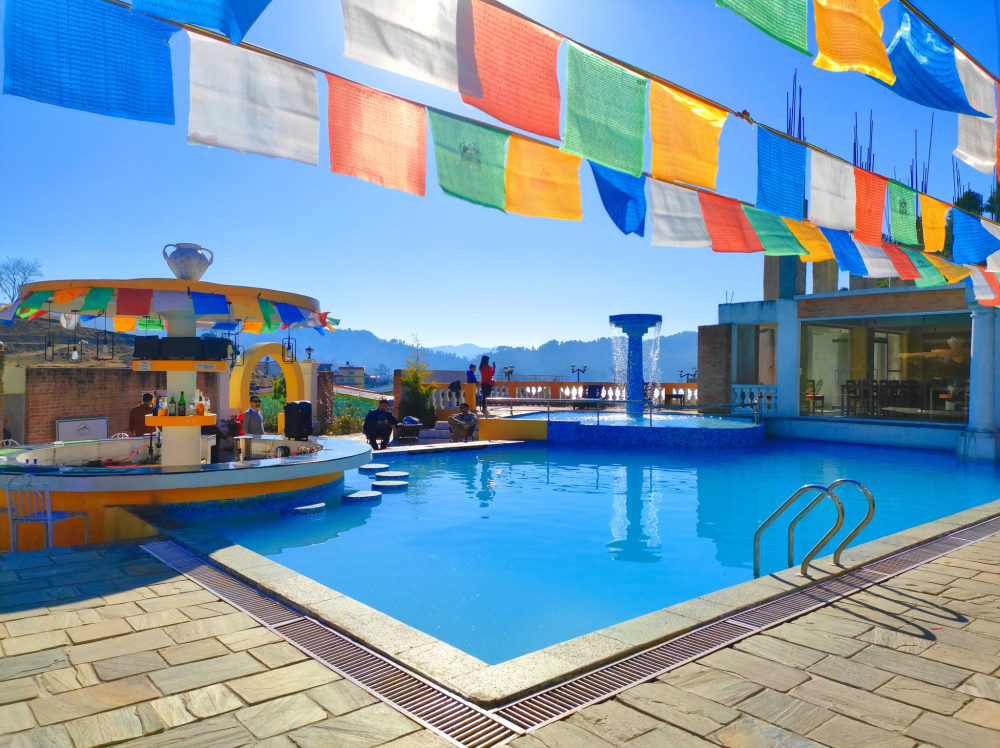 Arjun is delighted to reminisce about his childhood village days. A Panasonic radio was hanging on the wall of his room covered with red clay. Listening to Kishore Kumar's 'Dard Bhare Nagme' on the radio, Arjun used to keep writing on the paper all night - English and Maths. Where to write ? It would be quick . And he would often soak the copy written in the water of the drum overnight, the ink would run off. And, they used to dry the coffee in a pot. After drying, he used to press the shriveled paper on his neck for 3-4 days. And, in that again, he used to practice calculations with a pencil. Even the empty space left by printing advertisements and news in the newspapers with dalmoth or cumin, turmeric is not left to practice calculation . "Those days are the path I have walked," says Arjun, "Nowadays, even when I see my children throwing away a blank sheet of coffee, I shudder at the memory of those days." He used to get hungry without getting lunch at school - he would eat chutro, kafal, gurans, as much as he could eat in the jungle. He thought of a new idea of making lunch and buying coffee - he started making Pustkari by melting sugar at home. Bought half a kg of sugar for 10 rupees, coconut for 2 rupees. He melted it and sold it to his friends, for 25 paise a pot. Earned 60 rupees for the first time. And, that money bought a copy . In that way, it would have been beneficial to borrow and sell at a discount. That promotion business lasted for a long time . "Perhaps that's when the idea of business was planted in the brain," he says.
Arjun is delighted to reminisce about his childhood village days. A Panasonic radio was hanging on the wall of his room covered with red clay. Listening to Kishore Kumar's 'Dard Bhare Nagme' on the radio, Arjun used to keep writing on the paper all night - English and Maths. Where to write ? It would be quick . And he would often soak the copy written in the water of the drum overnight, the ink would run off. And, they used to dry the coffee in a pot. After drying, he used to press the shriveled paper on his neck for 3-4 days. And, in that again, he used to practice calculations with a pencil. Even the empty space left by printing advertisements and news in the newspapers with dalmoth or cumin, turmeric is not left to practice calculation . "Those days are the path I have walked," says Arjun, "Nowadays, even when I see my children throwing away a blank sheet of coffee, I shudder at the memory of those days." He used to get hungry without getting lunch at school - he would eat chutro, kafal, gurans, as much as he could eat in the jungle. He thought of a new idea of making lunch and buying coffee - he started making Pustkari by melting sugar at home. Bought half a kg of sugar for 10 rupees, coconut for 2 rupees. He melted it and sold it to his friends, for 25 paise a pot. Earned 60 rupees for the first time. And, that money bought a copy . In that way, it would have been beneficial to borrow and sell at a discount. That promotion business lasted for a long time . "Perhaps that's when the idea of business was planted in the brain," he says.
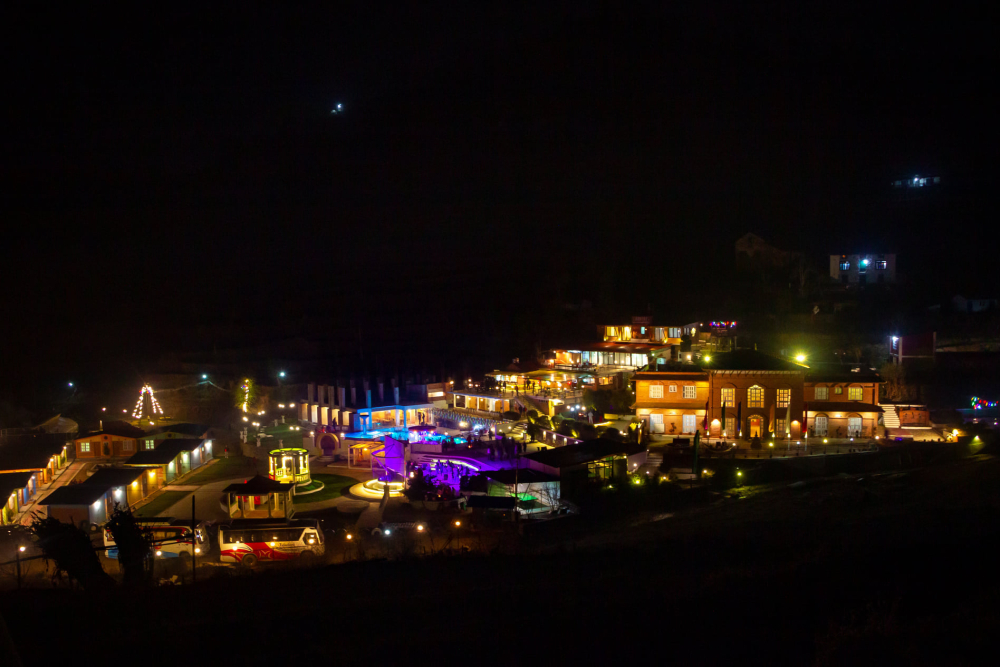
Arjun came to know that his family was very poor . Heard from his father when he was young, an old story . His landlord family was robbed and that family became very poor. Grandpa used to collect coins - in leather sacks and copper gyampos. Arjun's father was also young when the dacoit was at home. The robbers tied all the members of the house with ropes on the stairs and cut Gyampo with a sword and took away the money . There were 3 copper gyampos three feet high - silver coins. He also took a leather sack with money. Then ? Niras Arjun's father-uncles also cut the same ghyampo to make a living in the shop. Such was the story of his family in Ubela, the memory of which story Arjuna and his father become Ektamas .
Arjun passed SLC-054 in the year. The expenses were not enough, he gave up on his dream of becoming a doctor. Studied humanities at RR campus, rented a very cheap, dark room in Kathmandu, worked at a moneylender's shop, taught home tuition, worked at a printing house, learned computers and became a computer teacher at a boarding school. He has now bought the boarding school where he taught computers 20 years ago.
Started an IT company after passing computer diploma. Now Arjun has 3 IT companies. And then he began to dream of a resort. They say, 'The arrival of internal and external tourists is increasing in Tistung, Chitlang and Kulekhani, the resort is running well.'
What is Arjun's self-hypnosis towards the village?
 प्रकाशित : श्रावण ३, २०८१ ०६:३९
प्रकाशित : श्रावण ३, २०८१ ०६:३९

 २२.१२°C काठमाडौं
२२.१२°C काठमाडौं











